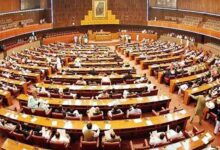PASTC-KP Alliance Applauds PM’s Tobacco Taxation Policy
Anti-Tobacco Activists and Child Rights Advocates Praise the Move as a Crucial Step Towards a Healthier Future

Peshawar: The Provincial Alliance for Sustainable Tobacco Control Khyber Pakhtunkhwa (PASTC-KP) has lauded Prime Minister Shehbaz Sharif’s new fiscal policy on tobacco taxation, which is in accordance with the World Health Organization (WHO) recommendations.
The move is a significant step towards reducing the use of tobacco products and promoting public health in Pakistan.
The PASTC-KP has been advocating for stronger measures to reduce tobacco consumption and its harmful consequences on public health for a long time. The new fiscal policy is a testament to the government’s commitment to prioritizing the health and well-being of its citizens.
Alliance members have expressed their pleasure in seeing the Pakistani government’s fiscal policy stance on raising taxes on tobacco products, in line with WHO recommendations. This move highlights the importance of prioritizing public health over short-term economic gains from the tobacco industry. By adopting such measures, the government demonstrates its commitment to reducing tobacco consumption, preventing tobacco-related diseases, and promoting a healthier society. This policy also aligns with global efforts to create a more equitable and sustainable world that values the well-being of all its inhabitants.
Qamar Naseem, Program Manager of Blue Veins, said, “Pakistan’s economic policies should not be swayed by the misinformation campaign propagated by the tobacco industry. It is essential for the government to continue making well-informed decisions that prioritize the health of its people. By aligning the country’s tobacco taxation policy with WHO recommendations, Pakistan has demonstrated its dedication to combating the tobacco epidemic.”
Anti-tobacco activist Usman Afridi emphasized the importance of the WHO’s EMPOWER policy, which outlines key strategies for effective tobacco control. Raising taxes on tobacco products is a crucial component of this policy, as it has been shown to be one of the most effective ways to reduce consumption, particularly among vulnerable populations such as youth and low-income individuals.
Sana Ahmad, Coordinator of the Child Rights Movement, said, “The implementation of the WHO EMPOWER policy, especially increasing taxes on tobacco products, is vital for Pakistan’s public health landscape. We must protect our citizens from the devastating health, social, and economic consequences of tobacco use.” She added, “By adopting a stronger fiscal policy on tobacco taxation, Pakistan is taking a crucial step towards a healthier future. The PASTC-KP will continue to support the government in its efforts to combat the tobacco epidemic and create a sustainable, healthy environment for all.”




